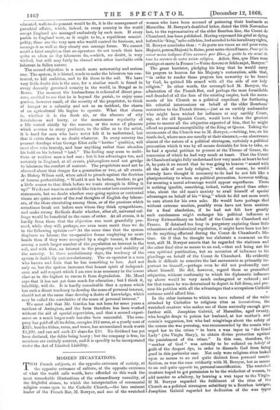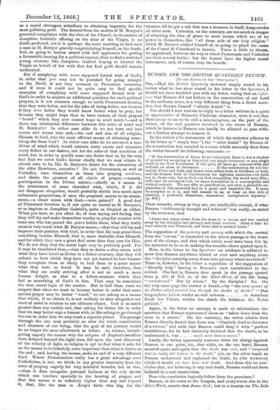MODERN INCANTATIONS.
Two French subjects, at the opposite extremes of society, at the opposite extremes of culture, at the opposite extremes of what the world calls worth, have afforded us this week the most remarkable illustrations of the extraordinary unreality, of the frightful abuses, to which the interpretation of ceremonial religion seems open in the Catholic Church,—the late eminent leader of the French Bar, M. Berryer, and one of the wretched women who have been accused of poisoning their husbands at Marseilles. M. Berryer's deathbed letter, dated the 18th November last, to the representative of the elder Bourbon line, the Count de Chambord, has been published. Having expressed his grief at dying before his " k ing," as he calls him, had acceded to his hereditary rights, M. Berryer concludes thus : " Je porte ces yams au ciel pour votre Majeste, poursaMajeste la Reine, pour notre chereFrance. Pour qu'ils soient mains indignes d'être exaucds par Dieu, je quitte la vie arise de tour les secours de notre sainte religion. Adieu, Sire, que Dieu vous protege et sauve la France !—Votre devoud et fidelesujet, Berryer."
The great barrister, pledging his king that he would carry his prayers to heaven for his Majesty's restoration, adds that, "in order to render those prayers less unworthy to be heard by God, he quitted life armed with all the aids of our holy religion." In other words, the accomplished M. Berryer, the admiration of the French Bar, and perhaps the most formidable and dreaded of all the foes of the existing empire, took the sacra- ments of his Church as a political expedient for furthering his celestial intercessions on behalf of the older Bourbons' restoration to the French throne,—just as an earthly ambassador who might have wished for influence at any earthly Court, say, at the old Spanish Court, would have taken the greatest pains to master all the etiquettes expected of him, that he might offend no personal susceptibility of the King or Queen. Taking the sacraments of the Church was to M. Berryer,—writing, too, on his death-bed, where men are usually at their sincerest,—an observance almost of the nature of a political stratagem, certainly a political precaution which it was by all means desirable for him to take, as he had a special petition to present at the Throne of Grace, the concession of which he had very much at heart. That the Count de Chambord might fully understand how very much at heart he had it, he puts it on record that he was going to heaven " armed with all the aids of our holy religion," which, of course, he would scarcely have thought it necessary to do had he not felt like a plenipotentiary to whom no political precaution, however trifling, for securing a moral advantage would appear superfluous. There is nothing ignoble, something, indeed, rather grand than other- wise, about the old man's anxiety to avail himself of special advantages on behalf of his "king," which he did not seem much to care about for his own sake. He would have perhaps died without extreme unction, possibly even have not been anxious for a final absolution, if he had not felt how greatly such carelessness might endanger his political influence as Envoy Extraordinary on behalf of the Count de Chambord and France. If detained too long in purgatory expiating these little relaxations of ecclesiastical regulation, it might have been too late to do anything effectual during the Count de Chambord's life- time. Or if that be thought too elaborate a comment on the text, still M. Berryer asserts that he regarded the viaticum and the other final rites as means to an end, —that end being not his own spiritual purification, but an accession of influence to his pleadings on behalf of the Count de Chambord. He evidently finds it difficult to conceive the last sacraments as primarily im- portant to himself,—perhaps even he did not profoundly care about himself. He did, however, regard them as prescribed etiquettes, without conformity to which his diplomatic influence up above would be very much endangered or reduced ; and for that reason he was determined to depart in full dress, and pre- sent his petition with all the advantages that a scrupulous Catholic costume could afford him.
In the other instance to which we have referred of the value attached by Catholics to religious rites as incantations, the wretched creature who makes use of them naturally enough goes further still. Josephine Gabriel, of Marseilles, aged twenty, who bought drugs to poison her husband, at her mother's and cousin's suggestion, but who had misgivings about the safety of the course she was pursuing, was recommended by the cousin who urged her to the crime " to burn a wax taper to ' the Good Lady' (the Virgin Mary), to obtain divine protection against the punishment of the crime." In this case, therefore, the "mother of God " was actually to be enlisted on behalf of guilt of the deepest dye, in order to dissuade God from being good in this particular case. Not only were religious rites looked upon as means to an end quite distinct from personal sancti- fication, as was the case evidently with M. Berryer, but as means to an end quite opposite to, personal sanctification. The wretched creature hoped to get permission to be the wickedest of women, to add murder to adultery, by burning a wax taper to the Virgil]. If M. Berryer regarded the fulfilment of the rites of the Church as a political stratagem subsidiary to a Bourbon intrigue, Josephine Gabriel regarded her dedication of the wax taper as a moral stratagem subsidiary to obtaining impunity for the most polluting guilt. The descent from the motive of M. Berryer's punctual compliance with the rites of the Church, to the motive of Josephine Gabriel's offering on the altar of the Virgin, is no doubt profound, yet it is perhaps the more startling to find such a man as M. Berryer gravely congratulating himself, on his death- bed, on going to heaven armed with full appliances for getting a favourable hearing for a political request, than to find a wretched young creature like Josephine Gabriel hoping to interest the Virgin on behalf of her wish that her foul guilt should remain undetected.
But if complying with some supposed formal wish of God's, in order that you may not be punished for going straight to the Devil, is not very common in Protestant countries, and if even it could not be quite easy to find specific examples of complying with some supposed formal wish of God's in order to acquire an additional purchase for one's political prayers, is it not common enough to catch Protestants desiring that they were holier, not for the sake of being holier, not because if they were holier they would know better what to pray, but because they might hope then to have certain of their prayers 4' heard" which they now cannot hope to avail much ?—and is there any substantial difference between this state of mind and M. Berryer's? In either case alike do we not turn end into means and means into end,—the end and aim of all religion, likeness to God, into the most efficient means of obtaining some- thing else from God ? In either case alike do we not covet a con- dition of mind which would restrain every excess and stimulate -every defect in our desires, not for the sake*of that condition of mind, but in order to gratify some one desire that is, by the very fact that we covet God's favour chiefly that we may obtain it, -almost sure to be, like M. Berryer's desire for the restoration of the elder Bourbons, excessive ? Do not Protestants, as well as Catholics, turn themselves at times into praying machines, and desire the greatest of all objects of prayer,—namely, participation in the Divine nature,—chiefly as a means to the attainment of some cherished wish, which, if it did not disappear altogether, would probably shrink into much more -submissive proportions, if once the proposed means to its attain- ment,—a closer union with God,—were gained? A good deal of Protestant devotion is, if not quite so unreal as M. Berryer's, or so impious as Josephine Gabriel's, quite as illogical as either. When you hear, as you often do, of men saying and feeling that they will try and make themselves worthy to pray for reunion with some one who has passed the grave before them, what they really mean is very much what M. Berryer meant,—that they will try and improve their position with God, in order that He may grant them something besides Himself, that is, more desirable than Himself, and for which they care a great deal more than they care for Him. We do not deny that the moral logic may be perfectly good. For it may be translated thus,—that they so desire a close union with what they have loved as divine in a fellow-creature, that they will -submit to laws which they have not yet learned to love because they recognize them as likely to lead them to a point nearer 'what they have so loved. It may be said, therefore, that what they are really striving after is not so much a mere human delight, as that in a fellow-creature which they feel as something. of God's in him. That may be sometimes the true moral logic of the matter. But in half these cases we suspect that when we want to become better in order that some -special prayer may be better " heard," we are asking as a means that which, if we obtain it, is not unlikely to alter altogether our state of mind in relation to our ultimate object. God is so much greater than any earthly end, that asking for divine life in order that we may better urge a human wish, is like asking to go through the sun in order that we may reach a superior planet. The passage through the sun may probably so alter the whole constitution and elements of our being, that the goal of the journey would be uo longer the same afterwards as before. As science, investi- gating eagerly the reason why the eclipses of Jupiter's satellites were delayed beyond the right time, fell upon the vast discovery of the velocity of light, so religion is apt to find what it asks for as the means to be infinitely more important than what it desires as the end ; and, having the means, seeks an end of a very different kind. Where Protestantism really has a great advantage over Catholicism, is not, we think, in any greater immunity from the error of praying eagerly for very doubtful benefits, but in this, —that it does recognize personal holiness as the only means which can conduce specially to the hearing of prayer, and that this means is so infinitely higher than any end beyond it, that, like the man in Esop's fable who dug for the treasure till he got a soil that was a treasure in itself, it superseders all other ends. Catholics, on the contrary, are too much in danger of attaching the idea of grace to mere means which are of no power iu themselves, like " all those aids of our holy religion " which M. Berryer availed himself of, in going to plead the cause of the Count de Chambord in heaven. There is little to choose, we apprehend, between the way in which Protestants and Catholics use their several faiths ; but the former have the higher moral instrument, and, of course, reap the benefit.



































 Previous page
Previous page